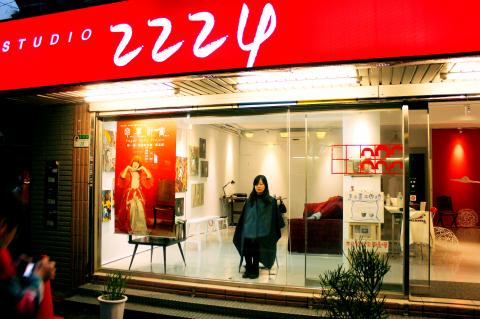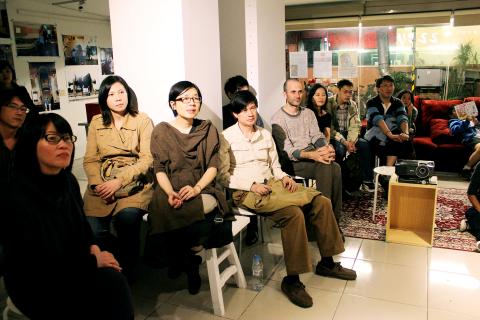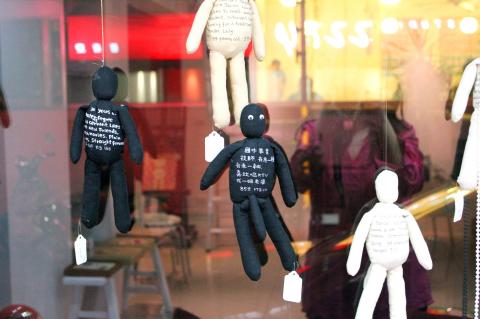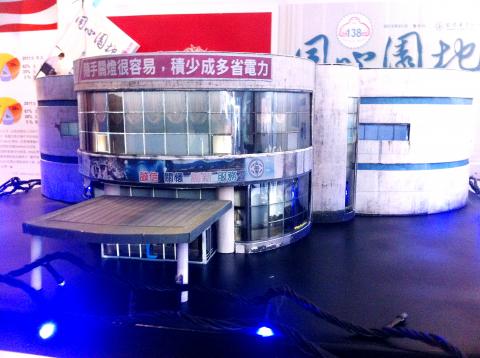Gloom and doom took center stage last weekend at the recently opened Studio 2224, a gallery-cum-performance space run by visual artist Charlene Shih (史筱筠) and US musician Jimmy Williams.
Suzuki Takahiko’s photographs of a typical Taiwanese family visiting the nuclear power plant in Wanli (萬里), New Taipei City, anti-nuclear short films shot by directors including Cheng Yu-chieh (鄭有傑) and Cheng Li-ming (鄭立明) that depict apocalyptic ruins and a doomsday concert by Japanese musician Koji Asano were among the works tangentially inspired by the Mayan apocalypse.
Shih, whose works mainly involve animation, film and installation art, said the idea to encourage and facilitate collaborative projects was inspired by a six-month artist-in-residence program at the Cite des Arts in Paris last year.

Photo: Ho Yi, Taipei Times and courtesy of 2224 Studio
“It was a totally inspiring experience. More than 300 artists from all around the world came to live and work together. You only needed to focus on your arts, without having to worry about all your troubles in real life,” Shih said.
“After coming back, we opened the studio in the hope of continuing the spirit of spontaneous collaboration. It is not just about creating art works with others, but building a meeting point for artists,” she said.
The studio opened in February with the whimsical Sugar Baby Project featuring artist Chou Meng-yeh (周孟曄). The unusual undertaking invited members of the public to become the artist’s “sugar daddies or mommies” during her residency at the studio. Patrons could choose to sponsor the whole project, parts of the creative process or even time spent with the artist — all depending on the amount pledged.

Photo: Ho Yi, Taipei Times and courtesy of 2224 Studio
Tomorrow, if we all survive the end of the world, the venue will host a series of video art works, online performances and film screenings that challenge and break the mainstream concept of gender and sexuality. Co-curated by Shih, Tseng I-hsing (曾怡馨) and Jian Chen from the US, the group show includes work by 10 queer artists, transgender activists and the sexually defiant from Taiwan, South Korea, New Zealand and the US.
Meanwhile, across town in Taipei’s Beitou District (北投), Suzuki and Taiwanese artist Huang Lan-ya (黃蘭雅) will open the latest installment of the ongoing project entitled Skin The Artist — Who is invited for dinner? (剝皮計畫 — 誰來晚餐?) at One Year Gallery (一年畫廊), an art space set up by the artist duo in 2008. To the artists, the space is more than a place that exhibits art works.
“We see the gallery as a long-term art project that involves time, space, human beings and arts,” Huang said.

Photo: Ho Yi, Taipei Times and courtesy of 2224 Studio
A good example of how the space becomes part of the creative process can be found in the Skin the Artist project, which has so far featured 11 local artists. For each exhibition, the space is divided into two parts. One displays art works like a usual gallery. The other functions as a repository and contains the artists’ manuscripts and personal documents.
Prior to each exhibition, Huang and Suzuki invite artists to a dinner party. In the company of friends and art students, the artist then talks about his or her art and life over a good meal and a few drinks. The dinner is recorded and played during the show.
“We don’t want to merely exhibit finished works. We want to bring in the artist and reveal what’s inside his mind,” Huang said. “We tend to work with artists who are unique in terms of their attitude toward arts, their artistic beliefs and creations. They don’t necessarily care for making a name in the art scene, and often possess strong social consciousness.”

Photo: Ho Yi, Taipei Times and courtesy of 2224 Studio
The latest installment features Liu Chiu-erh (劉秋兒), the owner of Dog Pig Art Cafe (豆皮文藝咖啡館) in Kaohsiung and a well-known figure in local cultural and social movements. The exhibition opens tomorrow at 3pm and runs for three consecutive weekends.
■ Studio 2224 is located at 26, Alley 1, Ln 426 Jinzhou St, Taipei City (台北市錦州街426巷1弄26號). For updates on exhibitions and information about submitting works, visit www.studio2224.com. More information about One Year Gallery, located at 6, Ln 61 Ziqiang St, Taipei City (台北市自強街61巷6號), can be found at: 1yeargallery.com.

On April 26, The Lancet published a letter from two doctors at Taichung-based China Medical University Hospital (CMUH) warning that “Taiwan’s Health Care System is on the Brink of Collapse.” The authors said that “Years of policy inaction and mismanagement of resources have led to the National Health Insurance system operating under unsustainable conditions.” The pushback was immediate. Errors in the paper were quickly identified and publicized, to discredit the authors (the hospital apologized). CNA reported that CMUH said the letter described Taiwan in 2021 as having 62 nurses per 10,000 people, when the correct number was 78 nurses per 10,000

As we live longer, our risk of cognitive impairment is increasing. How can we delay the onset of symptoms? Do we have to give up every indulgence or can small changes make a difference? We asked neurologists for tips on how to keep our brains healthy for life. TAKE CARE OF YOUR HEALTH “All of the sensible things that apply to bodily health apply to brain health,” says Suzanne O’Sullivan, a consultant in neurology at the National Hospital for Neurology and Neurosurgery in London, and the author of The Age of Diagnosis. “When you’re 20, you can get away with absolute

May 5 to May 11 What started out as friction between Taiwanese students at Taichung First High School and a Japanese head cook escalated dramatically over the first two weeks of May 1927. It began on April 30 when the cook’s wife knew that lotus starch used in that night’s dinner had rat feces in it, but failed to inform staff until the meal was already prepared. The students believed that her silence was intentional, and filed a complaint. The school’s Japanese administrators sided with the cook’s family, dismissing the students as troublemakers and clamping down on their freedoms — with

As Donald Trump’s executive order in March led to the shuttering of Voice of America (VOA) — the global broadcaster whose roots date back to the fight against Nazi propaganda — he quickly attracted support from figures not used to aligning themselves with any US administration. Trump had ordered the US Agency for Global Media, the federal agency that funds VOA and other groups promoting independent journalism overseas, to be “eliminated to the maximum extent consistent with applicable law.” The decision suddenly halted programming in 49 languages to more than 425 million people. In Moscow, Margarita Simonyan, the hardline editor-in-chief of the